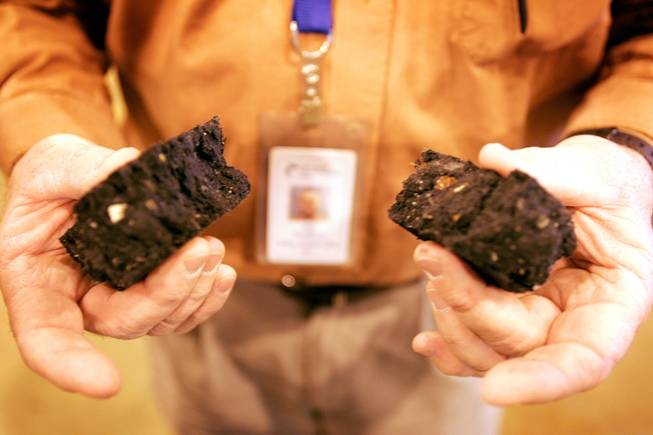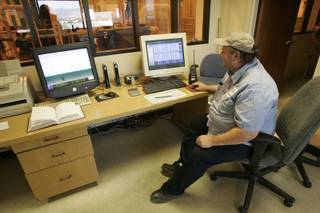
Bill Shepherd, manager of plant operations, holds de-watered solid waste, also called a “cake” at the Clark County Water Reclamation District’s solids de-watering facility.
Wednesday, June 11, 2008 | 2 a.m.
Sun Archives
- Landfill decree avoids big issue (5-15-2008)
- This fish story is true (4-21-2008)
- How deep is safe? (10-13-2005)
Next time you’re stuck in traffic and can’t figure out where that whiff of, oh, shall we say “post-digestion” odor is coming from, just look around for a red Republic Services dump truck.
If that’s the culprit, consider yourself lucky — despite the argument coming from your nose. You are in the company of a truck carrying a magic substance that helps keep your landfill from, well, filling up.
Curious? Read on. But first a caveat: This story could spoil your breakfast. The details are going to get back around to that post-digestion thing — and we’re out of euphemisms.
The naked truth is that Republic Services is using the leftovers from sewage treatment plants across the valley to hasten the rate at which garbage decomposes. It’s layering the landfill with “cakes” of the stuff, sent across town to Apex landfill in open-air trucks.
The cakes, as those in the business have christened them, are the floating and sinking parts of what comes from valley toilets, sinks and showers, strained and pressed into compact, 20-ton bundles.
At the plants, each cake is dropped, along with an accompanying sonic boom of stench, through what is essentially a sophisticated trap door into the aforementioned truck.
All told, 500 to 600 tons of the stuff — in 25 or 30 trucks — are moved daily from the various wastewater treatment plants across the valley to Apex. That’s 5 percent to 6 percent of the 10,000 tons of trash the landfill accepts every day.
The cakes’ raw ingredients are something most valley residents are all too happy to have disappear forever through the sewer pipes, but Alan Gaddy, area engineer with Republic Services, the trash hauler that runs the landfill, says the solid waste is a boon to the dump.
After the cakes are mixed into the garbage, bacteria from the sewage promote decomposition. Think smelly compost.
“If we weren’t adding sewage sludge ... (decomposition at the landfill) would take years longer,” Gaddy said.
The county pays $18 per wet ton, more than $6,800 for each day’s 19 cakes from its main treatment plant on Flamingo Road at Stephanie Street, which serves about 841,000 people in unincorporated Clark County. The facility’s annual bill from Republic Services is $2.6 million, almost half of the total cost of removing solid waste from the county’s wastewater.
The bill would be much higher in some other parts of the country, where landfills are two to five times more expensive, according to Bill Shepherd, manager of plant operations at the Clark County Water Reclamation District.
“Landfills are getting filled up around the country and they want to save space for domestic waste,” he said.
If Apex weren’t an option — either because it didn’t accept sewage sludge, like some landfills, or because it was too expensive — the reclamation district might have to make fertilizers and compost from the waste, Shepherd said. Before it could be used for agriculture, as it is in some states with large farming industries, it would have to be treated with chemicals and dried.
“It would probably be close to double the cost if we were to compost it and try to use it,” Shepherd said. The district has studied composting three times, and found each time that trashing it is more economical.
There would also be the matter of getting the general public to purchase and use the stuff and be open to whatever is grown out of it.
But getting the sludge out of Clark County’s wastewater stream and into the landfill isn’t as simple as just using a big strainer. It’s a costly and energy-intensive process.
Almost 30 percent of the Clark County Water Reclamation District’s $18.2 million main facility operating budget is spent removing solids from wastewater and transporting them to Apex. About 14 percent of the budget goes to trucking and disposal.
Lauren Fondahl, an environmental engineer with the U.S. Environmental Protection Agency, said there are no federal rules regulating transportation of biosolids and that they are commonly disposed of in landfills.
According to the National Manual of Good Practice for Biosolids, trucks should be covered to reduce smells and the risk of spills. Gaddy said Republic’s trucks, which are used only for transporting sewage waste, are usually partly covered.
Shepherd said the covers aren’t necessary because, unlike with regular trash trucks filled with bits of paper and garbage, nothing flies out.
According to Nevada law, only trucks with loads that might drop or fly out of the bed must be covered.
Sgt. Garth Gardner, with Nevada Highway Patrol’s commercial enforcement division, said because loads of sewage sludge are solid, they need not be covered.
“If you have a nice, solid load, bouncing down the road is not going to cause things to be lost,” Gaddy said.
The manual also offers tips for preventing and cleaning up spills. Shepherd said two or three times, trucks bound for Apex have had accidental discharges of their loads.
“The only time it’s been an issue is if a tailgate opened and (waste) lands all over the roads,” he said. “You get cleanup vehicles out there very quickly, because you have cars drive through it and you’re tracking that stuff into the general public. And it can be a little slippery.”
Shepherd said cleanup crews put down chlorine to disinfect the roads, but that sunlight and drying kill bacteria in the spilled cakes.
One possible consolation to those who drive convertibles or motorcycles behind Republic’s red trucks on Interstate 15 north: Shepherd said there has never been a spill on a valley highway. They’ve occurred only on streets, where it has been easier for traffic to steer clear.


Join the Discussion:
Check this out for a full explanation of our conversion to the LiveFyre commenting system and instructions on how to sign up for an account.
Full comments policy